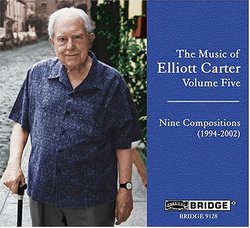Vive le Carter!
Joe Barron | Philadelphia, Pennsylvania United States | 07/06/2003
(5 out of 5 stars)
"The fifth offering in Bridge's indispensible series of the music of Elliott Carter contains nine compositions written from 1994 to 2002, when the composer, incredibly, was between the ages of 85 and 93. There are the usual short gems for various instruments that Carter has made a specialty in recent years. The disk begins with the fascinating "Steep Steps" for solo bass clarinet, an instrument Carter has exploited to great effect in his Piano Concerto and Triple Duo. Fred Sherry delivers a haunting rendition of "Figment No. 2" for solo cello. Subtitled "Remembering Mr. Ives" (Carter first met Ives as a teenager), the piece conveys a nostalgia rare in Carter's work, with short phrases evoking, though not quoting, the kind of hymns Ives used in his music. The Two Diversions for Piano are more transparent than some of Carter's other piano pieces, and rightfully so, since they were written for the Millenium Piano Book for pianists of intermediate skills. Charles Rosen, a long-time Carter champion, provides tender and beautiful readings. Soprano Tony Arnold's rendition of the song cycle "Of Challenge and of Love" seems softer and less forced than Lucy Shelton's premiere recording, which is all to the good, but for me the highlight of the disk is the Oboe Quartet, a major 14-minute work that shows Carter at the top of his instrumental game. Despite its unrepentant modernist idiom, this composition has a classical elegance, a romantic sensuousness, and a Baroque richness of counterpoint that doesn't showcase the soloist as much as make him a first among equals. It is as though the composer had written a new string quartet with the oboe subbing for the first violin. I could not wish for a better performance.
More!"
Fantastic from the first piece
Stephen J. Snyder | Lancaster, Texas United States | 01/22/2006
(5 out of 5 stars)
"Carter lets the bass clarinet show off every bit of its range in Steep Steps, from soulful low bass lines, through a smoky lower-midrange area, to an almost sax-like upper register.
All the cellos pieces are great, and the oboe quartet? The other reviewer nailed it; it's like the oboe is playing the lead violin line."


 Track Listings (14) - Disc #1
Track Listings (14) - Disc #1